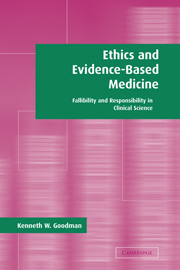Book contents
- Frontmatter
- Contents
- Preface
- Acknowledgments
- 1 Foundations and history of evidence-based practice
- 2 The research synthesis revolution
- 3 Evidence of evidence, and other conceptual challenges
- 4 Human subjects, the Internet, databases, and data mining
- 5 Evidence at the bedside
- 6 Public health policy, Uncertainty, and genetics
- 7 Ethics and evidence
- References
- Index
4 - Human subjects, the Internet, databases, and data mining
Published online by Cambridge University Press: 29 September 2009
- Frontmatter
- Contents
- Preface
- Acknowledgments
- 1 Foundations and history of evidence-based practice
- 2 The research synthesis revolution
- 3 Evidence of evidence, and other conceptual challenges
- 4 Human subjects, the Internet, databases, and data mining
- 5 Evidence at the bedside
- 6 Public health policy, Uncertainty, and genetics
- 7 Ethics and evidence
- References
- Index
Summary
Even the wisest of doctors are relying on scientific truths the errors of which will be recognized within a few years time.
ProustThe randomized, double-blind, placebo-controlled trial, about a half-century old, is reckoned to be the gold standard for acquiring evidence in medicine. Indeed, the randomized controlled trial (RCT) is the engine of evidence-based practice. But such trials are often either inapplicable or impossible, or they are in keen need of volunteers – both situations in which the Internet has been enlisted. Indeed, the use of computers and related tools to seek, gather, store, analyze, and share personal health information poses interesting and difficult ethical challenges, especially given advances in knowledge discovery in databases, in terms of the requirements of informed or valid consent, and facing the increased evidentiary burdens of contemporary practice. The stakes can be very high, indeed, when computers, consent, and confidentiality intersect as scientists try to develop early warning systems for bioterrorism.
Computers and consent
It is a common and unhappy misconception among health professionals that bioethics is a source of problems, controversies, and, worse, dilemmas rather than a source of solutions. In fact, bioethics has solved far more problems than it has raised, and it is only a kind of dilemma fetishism that has obscured this achievement: We savor and trade tales of intractability and discord like numismatists, philatelists, or children with Japanese game cards - the greater the error or conflict, the more valuable or reliable the currency, somehow.
- Type
- Chapter
- Information
- Ethics and Evidence-Based MedicineFallibility and Responsibility in Clinical Science, pp. 67 - 90Publisher: Cambridge University PressPrint publication year: 2002



